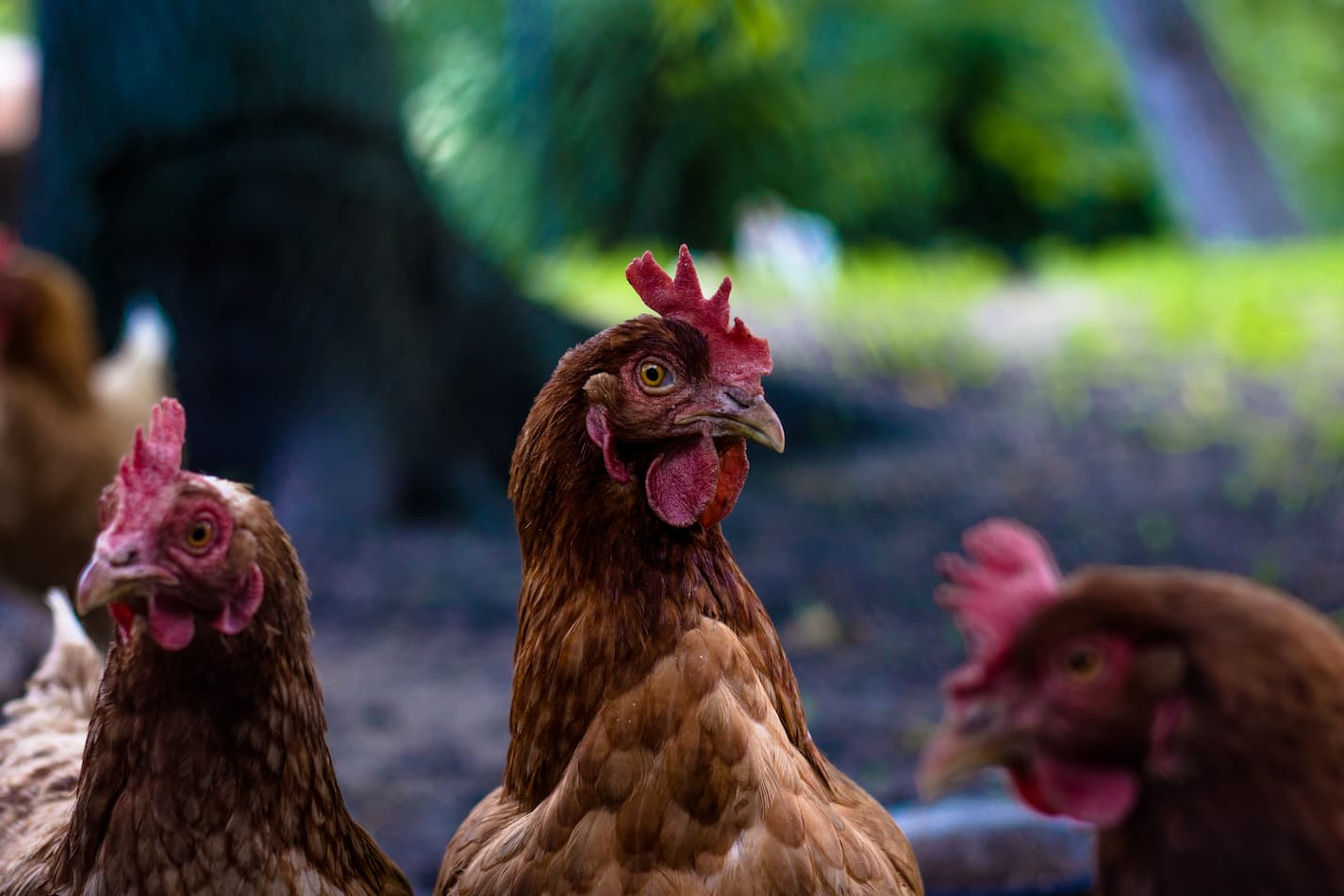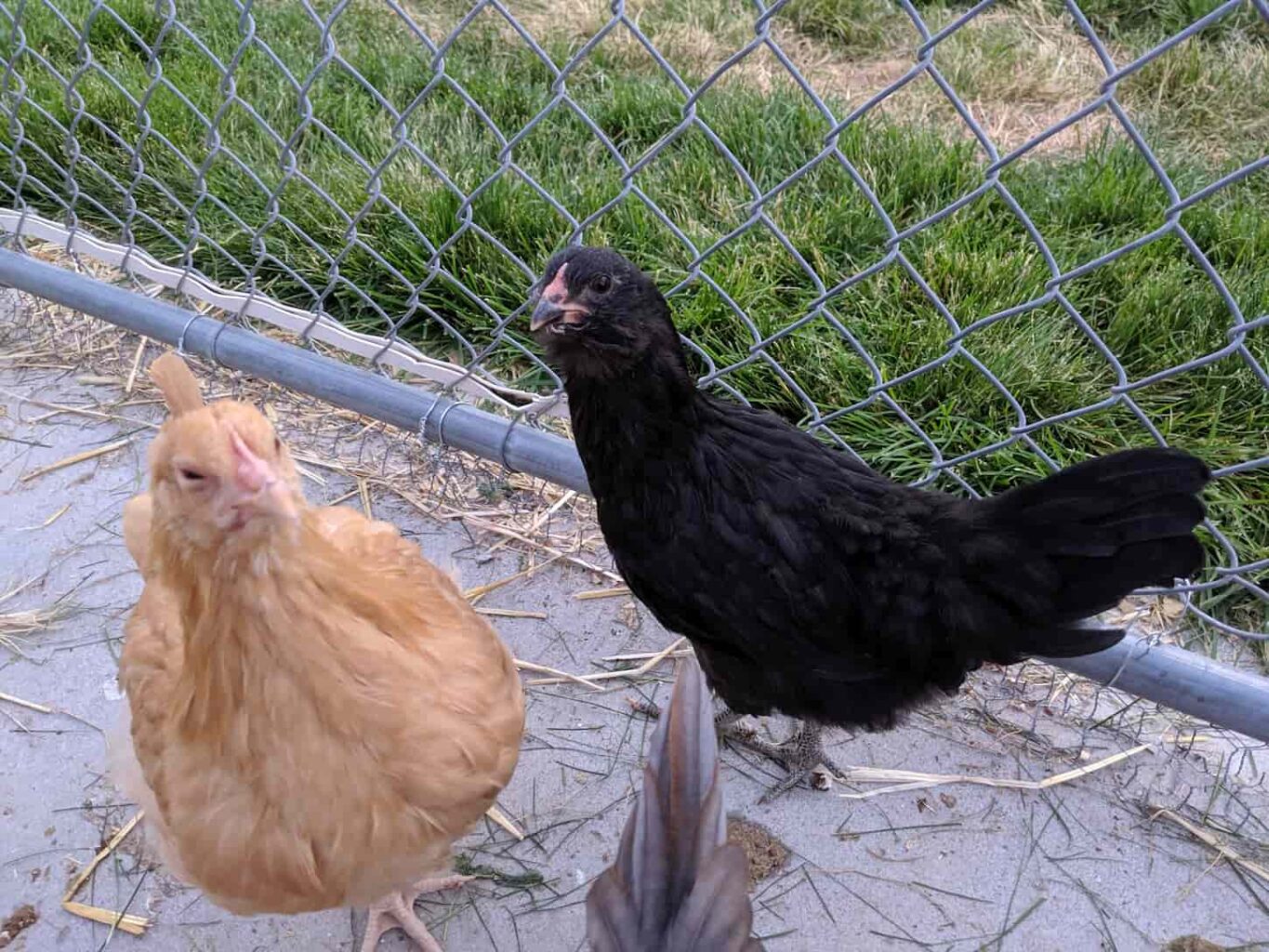Even before we first got our chickens, I wondered how long they would live – and what I would need to know in order to take care of them. So how long can and do chickens live? And which factors impact that length?
While chickens are capable of living up to 20 years, their life expectancy depends on their care, diet, breed, environment, safety, and purpose. Hybrid chicken breeds (bred for egg production) usually only live 2-4 years while heritage breed chickens live and lay for an average of 8-10 or more years.
Ready to know more about those 5 factors that affect a chicken’s life expectancy? Keep reading!

5 Factors that Affect Your Chicken’s Life Expectancy
There are 5 main factors that can impact your chicken’s life expectancy. They are:
- Care
- Diet
- Breed, purpose, and genetics
- Environment
- Safety from predators
Let’s talk about each of these in some more detail.
Chicken Care
Birds that are cared for will, naturally, live longer than birds that don’t receive care. This doesn’t mean you need to spoil your chickens – it just means they need the basics provided.
Chickens need access to food, clean water, and a safe place to live. Knowing about common chicken diseases (and how they spread) can also be helpful – so that you can prevent or at least lessen issues related to common chicken problems.
It’s also helpful to know upfront how much care you’ll provide for chickens. For example, are you comfortable providing chicken first aid? Or will you take your chickens to a vet for more advanced (and more costly) care? There’s not a wrong answer – it’s just what your answer is.
Typically, birds like chickens may not show signs of an illness until it’s in a later stage. This is because other chickens may turn on and kill a sick or weak chicken.
So it’s important to be familiar with your chickens so that you can spot early signs of issues – and take care of them as quickly as possible.
In our case, we’ve decided that chickens are a step up from farm animals, but that they aren’t pets on the same level as the cat and dogs. They’re more like fish. Even so, they will be cared for at home by us.
And because I’m a (people) nurse who’s done an awful lot of chicken research, I feel fairly confident that we’re able to provide decent quality care for our chickens.
Chicken Diet
Getting the right kind and amounts of food will impact your chicken’s life quality and expectancy – as well as how many eggs they lay.
When chickens don’t get enough food (or the right protein mixes), they will lay fewer eggs. Too little food (or the wrong mix of macronutrients) can also open the door to certain diseases and premature death.
Luckily, the bags of feed give great instructions. Make sure you’re using chick feed for chicks. As they grow, trade out that chick feed for pullet feed. And once they start laying, give your chickens the layer feed.
We supplement the appropriate type of feed with kitchen scraps and foraging. But that way, our chickens can always have what they need to be healthy, strong, and great layers.
Chicken Breed, Purpose, & Genetics
In general, heritage breeds of chickens live longer than hybridized breeds. This is because of genetics, unintended consequences, and a chicken’s intended purpose.
Heritage breeds of chickens are the more naturally-occurring breeds. Chicken farmers (and breeders) then began crossing heritage breeds with others in order to get breeds that lay larger eggs – and do so on a faster timetable.
Because hybridized breeds lay larger eggs (and do so faster), they are more prone to burning out or getting egg-bound. This shortens their life expectancy by a good deal.
Based on my research, heritage birds can live 8-10 years or longer – and lay that whole time. Hybrid chickens, on the other hand, usually live about half that long and have an increased risk of getting egg-bound.
We currently have 4 Easter Eggers and 2 Buff Orpingtons. We picked them based on breed temperament (we wanted chickens who had good a good reputation for being around kids) and egg color – the kids wanted fun colors of eggs. And all of our chickens have been socialized so that they are a lot of fun to spend time with.
Chicken Environment (Housing and Foraging)
Next, you’ll want to provide your chickens with a safe environment. Having a safe environment will give your birds not only a better life expectancy but also a better quality of life. And when your chickens are safe and happy, they’ll be better egg layers.
The first part of providing a safe chicken environment means housing and a safe place to eat. A chicken coop doesn’t have to be super fancy, but it does need to be super safe. We’ll talk about why that is in the next section. It also needs to be clean-ish.
Now, a chicken coop will get dirty on a regular basis. Chickens aren’t exactly the cleanest of animals! Even so, keeping things tidy-ish will help prevent several kinds of diseases and the spread of others.
We use a deep litter method to keep the balance between keeping things tidy and helping our chickens build up a natural immunity to diseases. That way, things stay tidy and disease-free, but I’m also not having to scoop litter every time a chicken poops.
Second, you may want to consider giving your chickens a safe place to forage for food. If you provide all of their food, it’s not required. However, I’ve found that our chickens are much happier (and definitely less stir crazy!) when they get out to forage for their own food in their designated pasture space.
Another part of the environment and housing is deciding whether or not to provide extra lights during the winter. Doing so can help boost winter egg production. However, doing this can potentially shorten your chicken’s lifespan or overall egg production quality.
Our chickens have a coop in an old dog run that’s been converted to a chicken run. Their coop keeps them warm and safe. They have access to clean water and appropriate feed. And they have plenty of space to roam in their chicken pasture – so that they can forage at their leisure.
Chicken Safety from Predators
Finally, you’ll want to make sure that your chickens are safe from predators. Predators are the fastest way to shorten your chicken’s life expectancy. Predators also come in all shapes and sizes – and the types of predators in your area will vary widely from predators in other areas.
So it’s important to know what the common predators are in your area. Start by asking your chicken-owning neighbors if they’ve had any issues with predators. Or if none of your neighbors have had any issues, look up common predators, omnivores, or predators of opportunity who may be in your area.
In our area, the main predators are foxes, coyotes, raccoons, and birds of prey. Pets like roaming dogs and cats are also potential predators. Several neighbors have lost chickens to raccoons, so those are the main concern. Our yard is fully fenced, so foxes and coyotes would have a lot of difficulties getting access to our chickens. Hawks and owls have been a concern – a neighbor did lose a small dog to a bird of prey some years back.
Then, build your coop to be a safe haven from any predators. You may also want to reinforce your run and/or foraging area, depending on how many predators are in your area.

Our coop is built within a solid, chain-link fence that used to be a dog run for a large dog (from the previous owners). We built a better roof on it and then I reinforced it (and especially any gaps) with chicken wire. We also use a gate that our kids can’t quite open yet. That way, a raccoon can’t get in.
A good rule of thumb to know for keeping your chickens safe from raccoons: if your toddler can get to the chickens, so can the raccoon.
Our pasture is more open – and there’s no roof. So while the chickens are out in the pasture area, they are more vulnerable. However, we do give them some shaded areas and constant access to their run should they need a place of retreat.
In any case, build your chicken’s home and foraging area to be as safe as possible from predators. That way, they’ll live longer and keep laying eggs.
How Long Do Chickens Live as Pets?
Chickens who get adequate care (and have the above 5 factors managed) can live up to 20 years of age, depending on their breed. Keep in mind that heritage breeds will generally live longer than hybridized breeds.
I have friends and online acquaintances who report their chickens living up to 14-15 years without much intervention. The chickens who live 20 years usually have extensive veterinary care.
On average, most backyard and pet chickens live up to 8-10 years.
How Long Do Free Range Chickens Live?
If a chicken is a full-time free-range (or wild) bird, it will probably live a much shorter life than does a chicken who only free ranges during the daytime hours (and returns home to a coop each night).
Free-range chickens may live as long as a pet or backyard chicken does if it has access to a safe place from predators.
My sister-in-law’s chickens are allowed to free-range on several acres all day. Under the protection of a rooster, she hasn’t lost many birds. In fact, it’s usually the rooster who sacrifices his life for that of the hens. I believe she’s lost two roosters to foxes. So far, despite numerous circling hawks, the hawks aren’t eating any chicken dinners.
Our chickens get to free-range in our backyard within a fenced-off area. We don’t have any roosters playing protectors, but our dog and kids are all amazing at chasing off the occasional hawk.
How Long Do Chickens Live in Factory Farms?
From my research, I’ve found that most commercial egg-laying chickens only live 1-3 years. This is because for several reasons – the main one being that commercial egg layers are designed to pump out as many eggs as possible in a short amount of time.
This literally exhausts the chickens – and they’re done. At that point, most commercial farms will cull and process the chickens into some kind of meat product – usually pet or animal feed.
What Breed of Chickens Live the Longest?
According to my research, heritage breeds of chickens live longer than hybridized chicken breeds. Here are some common backyard homestead chicken breeds and their life expectancy.
| Breed | Hybrid or Heritage | Life Expectancy |
|---|---|---|
| Americauna (Easter Eggers) | Hybrid | 8 or more years |
| Golden Comets | Hybrid | Living for 5 years is considered old |
| Orpingtons | Heritage | 8 or more years |
| Rhode Island Reds | Heritage | 8 or more years |
| Wyandottes | Heritage | 6 or more years |
At the time of publication, we have 4 Easter eggers and 2 Buff Orpingtons. They’re all coming up on a year old and do great. My sister-in-law’s chickens (she has a whole zoo’s worth of breeds) are several years old and still lay regularly.
Related Questions
How Many Years Will Chickens Lay Eggs? Chickens continue to lay eggs their whole life, although the speed or rate of egg-laying does naturally decrease as chickens age.
How Do You Clean Farm Fresh Eggs? Wiping the egg off with a damp cloth is generally sufficient. If an egg is visibly soiled, washing it with soap and warm water may be needed.
